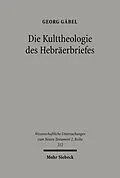Georg Gäbel analyzes the cultic theology of the epistle to the Hebrews which shows that Christ's sacrifice is the inauguration of the new, heavenly cult. The addressees of the epistle are to understand themselves as participators in and indeed as priests of this heavenly cult.
The cultic theology of the Epistle to the Hebrews is not a critique of cultic sacrifice that aims at a non-sacrificial interpretation of Christ's saving work and of Christian faith and life; on the contrary, it shows that Christ's sacrifice is the inauguration of the new, heavenly cult. The addressees of the Epistle are to see themselves as participators in and indeed as priests of this heavenly cult. At the same time, however, this exclusive attachment to the heavenly cult makes it impossible for them to continue participating in cultic activities on earth. While the believers' participation in the heavenly cult is founded on Christ's ministry as a high priest in heaven, their life on earth is modelled on the example of Christ's earthly life, suffering and obedience. Firmly rooted in early Jewish discourses concerning cultic theology and practice, the Epistle urges readers to take part in the heavenly cult and to abstain from participation in Jewish cultic activities.
Autorentext
Geboren 1969; Studium der ev. Theologie in Tübingen, Durham (England) und Bonn; Vikariat, Probedienst und Ordination in der Evangelischen Kirche im Rheinland; Assistent an der Kirchlichen Hochschule Wuppertal; wiss. Mitarbeiter an der Universität Saarbrücken; z.Zt. Religionslehrer an einer berufsbildenden Schule.
The cultic theology of the Epistle to the Hebrews is not a critique of cultic sacrifice that aims at a non-sacrificial interpretation of Christ's saving work and of Christian faith and life; on the contrary, it shows that Christ's sacrifice is the inauguration of the new, heavenly cult. The addressees of the Epistle are to see themselves as participators in and indeed as priests of this heavenly cult. At the same time, however, this exclusive attachment to the heavenly cult makes it impossible for them to continue participating in cultic activities on earth. While the believers' participation in the heavenly cult is founded on Christ's ministry as a high priest in heaven, their life on earth is modelled on the example of Christ's earthly life, suffering and obedience. Firmly rooted in early Jewish discourses concerning cultic theology and practice, the Epistle urges readers to take part in the heavenly cult and to abstain from participation in Jewish cultic activities.
Autorentext
Geboren 1969; Studium der ev. Theologie in Tübingen, Durham (England) und Bonn; Vikariat, Probedienst und Ordination in der Evangelischen Kirche im Rheinland; Assistent an der Kirchlichen Hochschule Wuppertal; wiss. Mitarbeiter an der Universität Saarbrücken; z.Zt. Religionslehrer an einer berufsbildenden Schule.
Titel
Die Kulttheologie des Hebräerbriefes
Untertitel
Eine exegetisch-religionsgeschichtliche Studie
Autor
EAN
9783161570667
Format
E-Book (pdf)
Hersteller
Genre
Digitaler Kopierschutz
Adobe-DRM
Dateigrösse
46.54 MB
Anzahl Seiten
613
Lesemotiv
Unerwartete Verzögerung
Ups, ein Fehler ist aufgetreten. Bitte versuchen Sie es später noch einmal.
